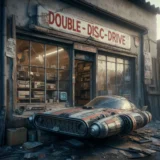 Welcome internet traveler. I will be stockpiling neatly organized bits into a collective known as a blog along this portion of your journey. Do not fear for your personal safety, as I will take great care to observe the rules of hospitality during your visit. As I am a certifiable Tech Geek, I will spend a portion of my efforts exploring the connection between science and technology and science fiction, fantasy, and horror literature. Please observe all safety regulations as the bits in my collection coalesce.
Welcome internet traveler. I will be stockpiling neatly organized bits into a collective known as a blog along this portion of your journey. Do not fear for your personal safety, as I will take great care to observe the rules of hospitality during your visit. As I am a certifiable Tech Geek, I will spend a portion of my efforts exploring the connection between science and technology and science fiction, fantasy, and horror literature. Please observe all safety regulations as the bits in my collection coalesce.
In 1948, George Orwell created the science fiction classic Nineteen Eighty-Four that introduced the world to Big Brother and shaped the global psyche. In the novel, Big Brother rules with absolute authority by shining the spotlight on every citizen. In Oceania there is no privacy; “Big Brother is watching you.” That phrase inspired the free world to suddenly wonder who was watching them. They demanded transparency regarding government activities, while insisting on the importance of personal privacy. Sixty-five years after the landmark novel penetrated our culture, I find myself looking around to measure my privacy. As I do, I wonder if privacy still matters.
I always say that technology marches forward whether we like it or not. Public demand provides the fuel to keep the engine running, but we consumers are a fickle lot. We clamor for technology to entertain us and make our lives easier as well as safer, but we draw a moving line that should not be crossed. In the novel, Big Brother uses technology to conduct surveillance on the population at large. Telescreens are two-way television screens used to watch the watchers. As I sit typing this blog on my laptop, I gaze at the cold eye of my webcam wondering if anyone is watching. Cameras are everywhere. We carry them in our pockets. We mount them at the bank and on our satellites. Cameras monitor traffic signals and weather conditions and hotel guests and store shelves and airport terminals. Every day, everywhere, I see a camera lens and wonder who is watching me. Is it Big Brother? Is it your neighbor, or do I even care?

With our current technology, cameras and the smarts behind them have progressed well beyond what even Big Brother could have imagined. As we know, cameras at a base level are created to capture images. Stepping beyond this we consider that the image is frequently captured in order to identify someone. With our global society, the desire to quickly and accurately identify people has become a necessity. Privacy advocates warn against this intrusion, while demanding for technology to keep the world safe. Is it best to protect the good apples from intrusion while sorting out the bad?
The science of identification grows by leaps and bounds every nanosecond. Today people can be identified by iris patterns, fingerprints, facial structure, earlobes, voice qualities, forehead shape, the way they type on a keyboard, and the gait of their walk. Nations like India are undertaking massive efforts to record each identifiable marking of every citizen. (Over a billion strong.) Not all care for this sweeping surveillance. Counter-surveillance gadgets can identify every camera in the room and pinpoint every listening device. You might think these are reserved for James Bond, but they too could be yours with only a few mouse clicks and a modest charge to your credit card. I see these devices and wonder who buys them? Are they reserved for those paranoid fans of George Orwell?
My instinct is to fight against such a subtle intrusion of my personal world, to demand an end to the invasion. Propelled by my passion, I hunt for other paths of ingress. My search once again falls upon the lifeless eye of my webcam as it stares back at me, mocking me and my illusions of privacy. I look at the webpage I’m on that advertises a pizza shop in my neighborhood. The IP address of my internet connection has been physically located so that advertisers can target me with merchandise in my area. My friend the computer collects petabytes of information on me in order to better serve me. It knows me better than my mother does. It knows what I eat, what I read, where I live, what I drive. In fact, given a few minutes, it can even show me a photo of my house. I feel safe in the knowledge that this information is quietly kept secret between me and my computer. I wink at my webcam. Our secret.
The Google Transparency Report is published every year so that we know what Big Brother is up to. Beyond the listing of Removal Requests, Google provides a report on User Data Requests. That’s right–Big Brother sidles up to our close friend Google every year and asks him to reveal all our intimate secrets. Google reports on which requests were provided and which were denied. Cue sound of a scratching record. Hold everything. Did I get that right? The CIA and FBI are asking Google for information about me. What kind of information could they be collecting?
Ray Kurzweil, one of the foremost scientists in the field of artificial intelligence, recently signed on with Google. According to Ray, the mission is to create artificial intelligence that mines the hoarded information in order to better assist us. Discussions have moved to eavesdropping on phone conversations and parsing email in order to anticipate our every need and desire before we know we have them. I throw up my hands and shout, “Stop!” This is too much. The picture in my mind of who Big Brother is shifts a few degrees, and I start searching for the URL of that counter-surveillance shop.
![]() Before the site loads, I decide to pop up another browser and check my Facebook page and pound out a few angry keys on my Twitter account. Then the irony slaps me in the face. I realize that here I am posting every intimate detail of myself on the internet for anyone to find as I tweet out every single thought that enters my mind. Image recognition software has advanced to the point that a simple photo of me taken on the street can be used to match against my posted images. That stranger or stalker I ran into at the mall can, in one evening, discover my entire life’s history.
Before the site loads, I decide to pop up another browser and check my Facebook page and pound out a few angry keys on my Twitter account. Then the irony slaps me in the face. I realize that here I am posting every intimate detail of myself on the internet for anyone to find as I tweet out every single thought that enters my mind. Image recognition software has advanced to the point that a simple photo of me taken on the street can be used to match against my posted images. That stranger or stalker I ran into at the mall can, in one evening, discover my entire life’s history.
That is when I finally see it for the first time. The walls of my house are made of glass. I look at the calendar and it says 2013, but I swear it is Nineteen Eighty-Four. George Orwell wrote about a world where Big Brother was watching, but in our world everyone is watching. I find you on YouTube and Google Plus. I know what you ate for lunch and what you thought about it. Technology has pulled us into a world where there are no more secrets. We freely give away our privacy but warn Big Brother to keep out. Is he sitting somewhere twisting the ends of his mustache, laughing at our dichotomy? For that matter who is Big Brother? The government? Google? Us? As I sit on my transparent chair in my glass house staring into a camera, I wonder if we have evolved beyond our apprehension that sprouted from Nineteen Eighty-Four. I smile into the camera and post my dinner plans on Twitter.
R.K. Troughton works as an engineer, developing tomorrow’s high-tech gadgets that protect you from the forces of evil as well as assist your doctor in piecing you back together. His passion for science fiction and fantasy has been fed through decades of consumption. He is the author of numerous science fiction and fantasy screenplays and short stories, and his debut novel is forthcoming. His articles appear every Wednesday morning on Amazing Stories.










Fortunately, Kurzweil is joke who hasn't done anything significant in his field for 35 years, other than make promises about "the singularity" that haven't come true and making absurd quasi-religious predictions about AI creating immortality. The fact that Google is hiring him makes me less worried, rather than more worried, about "Big Brother."
The thing about our society is that we tolerate an awful lot, so long as the electricity is on and we have access to the mall. Most people really don't pay any attention to their privacy or their rights until they are broken, and they are extremely likely to ignore the rights of someone else being broken, especially if those people are unlike themselves.
Right now for instance, our drones are firing missiles at "militants" in a country we are not at war with, based on vague evidence that they are plotting something. The evidence is never presented to anyone but a few people in a closed room, and there is a lot of evidence that we've killed a great many people who were simply standing next to one of these militants at the time. Thirty years ago, this would have been a huge deal. Today, we barely pay attention at all.
In a few years, civilian use of drones will be accepted in the United States and contractors are already jockeying for position. I wonder how long it is before drones are used for surveillance within the United States?
Hey, Great Post. The Eye is everywhere watching. Your observations are right on, especially about the willingness of everyone to hand over their privacy to whoever wants to invade it via the Internet. It's actually pretty mind boggling, and I suspect it's already to late to snatch back whatever illusory privacy we thought we had before all this began. Better not write too many of these kinds of blogs, R. K. If they think you're wise to them, there could already be a drone with your name on it.